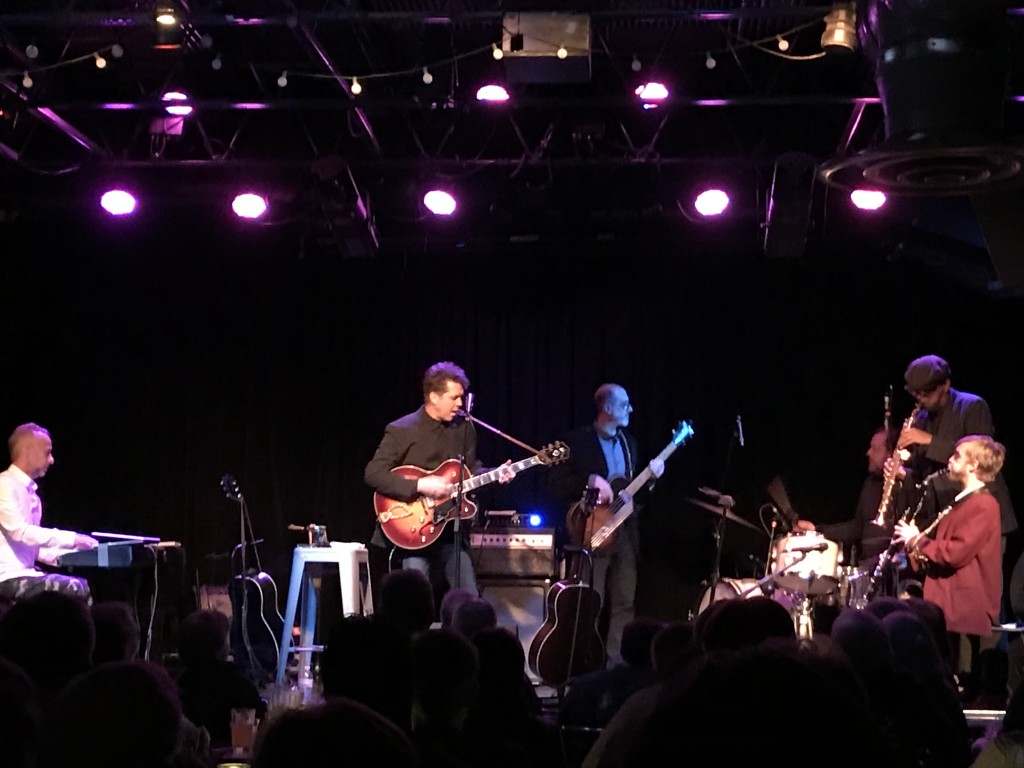 A saving grace of not exactly being a household name is the ability of fans to hear the music of someone like Joe Henry in such an intimate setting as Jammin’ Java, a stripmall oasis in a Virginia suburb outside of D.C.
A saving grace of not exactly being a household name is the ability of fans to hear the music of someone like Joe Henry in such an intimate setting as Jammin’ Java, a stripmall oasis in a Virginia suburb outside of D.C.
A hushed crowd of 100 or so is perfectly suited to the nuanced chamber-folk with a jazz flourish that Henry produces with his fine L.A. band.
Henry’s deep voice matches his brainy songs that often march to deliberate beats. Still quite youthful at 57, he began the show Tuesday solo, deconstructing one of his most enduring, enigmatic tunes, “Trampoline.”
Then he was joined by his longtime band that includes Patrick Warren on keyboards, David Pilch on bass, the inventive Jay Bellerose on drums and percussion and Henry’s son Levon on tenor saxophone and alto clarinet – an expressive instrument that snaked its way into a lot of songs, providing the perfect mournful undertone.
Another Henry who wasn’t a relation — jazz saxophonist Vincent Henry — sat in for a few songs and he and the younger horn man seemed to have a good time playing off of one another. It was a trip to watch Bellerose work — for some songs he’d have both sticks in one hand handling the set, while the other was reserved for tambourine. He knew when to build and when to hang back. There was nothing standard about his approach.
Henry said he was reluctant to use a gig as a way to promote new product — “and yet,” he added, before going into the first of what would be nine of the 11 cuts from Thrum, his 14th solo album, released in late October.
Most of its songs were, as he described them, “sad waltzes.” But they also came out of the trance following last year’s election, its swirling, dense poetry mixing with a kind of doom in his melancholy voice.
In them, he’d look for a glimmer of hope, as in “Dark is Light Enough.” Or he’d appreciate the power of what he and what we all have in music in “Blood of the Forgotten Song.”
In the end, he rallies the power of unity in “Keep Us in Song.”
As well received as they were, the new songs made way for a few older things as well, from “Bellwether” to the one song, he said, that “paid for these shoes and straightened his teeth,” pointing toward his son — “Stop,” his tango that was remade into his sister-in-law Madonna’s album Music as “Don’t Tell Me.”
A big surprise came in the encore when he played for what he said was only the second time his epic “Richard Pryor Address a Tearful Nation” allowing the improvisation of his acoustic band to rally, with the young Henry doing well playing the parts performed by Sonny Rollins on the original recording.
In his prestigious career — which would be notable from his production alone of memorable work by Bettye Lavette, Solomon Burke and Allen Toussaint, among others — Henry was also once in the alt-country category, as unusual as that might seem now. So after all the acoustic improvisation and jazz shadings, he ended with a traditional cover of Ray Price’s “For the Good Times” with show opener Rose Cousins, the Canadian folksinger whose latest, recently Grammy-nominated album he also produced.
The setlist for Joe Henry Tuesday was:
- “Trampoline”
- “Climb”
- “Believer”
- “Dark is Light Enough”
- “Blood of the Forgotten Song”
- “Bellwether”
- “This Afternoon”
- “Hungry”
- “World of This Room”
- “River Floor”
- “Stop”
- “Now and Never”
- “Keep Us in Song”
- “Eyes Out for You”
- “Richard Pryor Addresses a Tearful Nation”
- “For the Good Times”